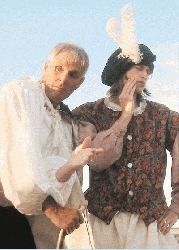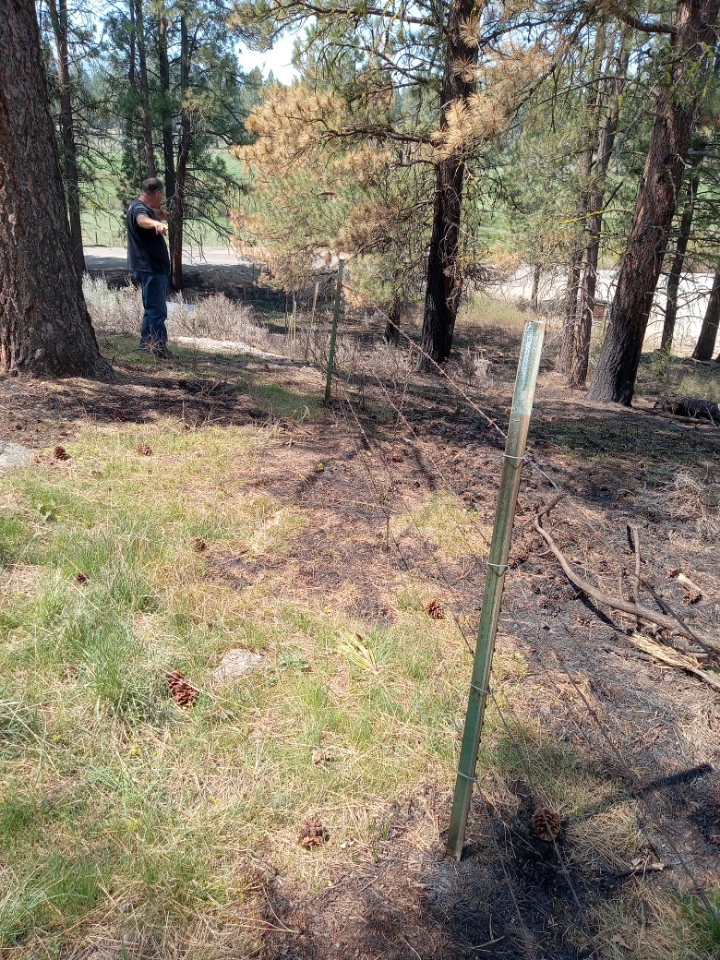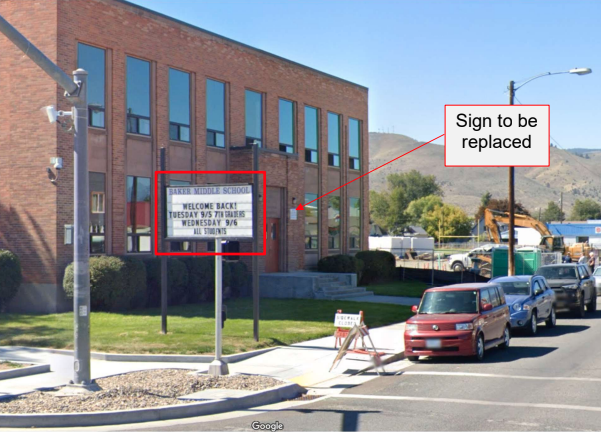Shake your fear of Shakespeare
Published 12:00 am Tuesday, August 9, 2005

- John Goodyear, left, and Stevie Martin mull over the antics of Sir John Falstaff during the opening act of "The Merry Wives of Windsor." (Baker City Herald/Lisa Britton).
By LISA BRITTON
Of the Baker City Herald
Does the mere mention of Shakespeare make you shudder?
The works by this 16th-century playwright shouldn’t make you cringe chances are good that by the end of the day you’ll use one of the 1,700-plus words William Shakespeare introduced into the English language.
During his day, most people had a vocabulary of 800 to 900 words.
andquot;He had some 2,600. The only way he could have that many was to invent a bunch of them,andquot; said Lynne Burroughs, who has studied Shakespeare for years, teaches his plays at Baker High School, and advises the BHS drama department.
Here’s a sample of the words Shakespeare created, according to the BBC Web site: aerial, critic, submerge, majestic, hurry, lonely, road, assassination, laughable, reliance and exposure.
The playwright is also credited with these phrases: andquot;break the ice,andquot; andquot;all that glitters is not gold,andquot; andquot;hot-blooded,andquot; andquot;in the mind’s eye,andquot; andquot;It’s all Greek to me,andquot; andquot;the naked truth,andquot; andquot;one fell swoopandquot; and andquot;method in his madness.andquot;
Not bad for someone who never attended a university and whose plays are still performed more than 400 years after he penned the scripts.
This month his influence is coming to Baker City with Eastern Oregon Regional Theatre Inc.’s production of andquot;The Merry Wives of Windsorandquot; on Aug. 11-14 and 18-21.
andquot;This is one of the easier comedies to understand,andquot; Burroughs said.
Performances start at 6:30 p.m. each night on the lawn behind St. Francis de Sales Cathedral, the corner of Baker and Second streets.
General seating tickets are $8 and available at Betty’s Books. There will also be 25 groundling tickets (a seat on the grass) available at each show for $5 each.
The language of Shakespeare
Shakespeare’s career in the theatre spanned two centuries, from the 1580s to 1613. He died in 1616 at the age of 52 and is credited with 37 plays, 154 sonnets and two epic poems.
Though Shakespeare’s language might sound foreign at first, Burroughs said it’s really not that different from modern American dialects.
andquot;The ‘accent’ of Shakespeare’s time would be closer to the accent of America’s south,andquot; she said. andquot;The sound of Shakespeare is a far cry from the clipped speech of modern London.andquot;
Burroughs, who founded Eastern Oregon Regional Theatre three years ago with Abby Dennis, was able to visit England several summers ago to study Shakespeare when The English-Speaking Union encouraged her to apply for a grant to fund the trip.
andquot;We saw Shakespeare’s London,andquot; she said.
She joined Shakespeare scholars from around the world at the Globe Theatre to learn about Shakespearean performance, such as how to direct the plays and how to prepare people to understand the stories.
Burroughs’ advice to anyone attending a Shakespeare play is to focus on the story rather than concentrate on the words.
andquot;You need to just relax and not try to understand everything, just understand the story,andquot; she said.
And Shakespeare’s plays were written to be performed, not read silently by students who struggle with understanding the action.
andquot;They are plays they’re not short stories, not novels,andquot; she said. andquot;Sometimes we go a little over the top with the slapstick just to make sure the story’s told.andquot;
And Shakespeare’s plays were attended by people from all walks of life.
andquot;From Queen Elizabeth, who had her own box, to the street cleaners,andquot; Burroughs said.
Queen Elizabeth’s love of the arts and her influence is credited with the character of Sir John Falstaff in andquot;The Merry Wives of Windsor.andquot;
Falstaff first appeared in the plays andquot;Henry IV, Part Iandquot; and andquot;Henry IV, Part 2andquot; and met his death in the latter script.
andquot;Queen Elizabeth liked Falstaff’s character so much that she sent word that she’d like to see more of Falstaff. Shakespeare was one of the first to be obliged to resurrect a character,andquot; Burroughs said with a laugh.
The queen also would have fancied how Shakespeare portrayed his female characters, she said.
andquot;Shakespeare’s heroines are generally quite bold,andquot; Burroughs said. andquot;His women were women of character that would appeal to Elizabeth as well because she was certainly a feminist.andquot;
A primer on the play
For those who want a little background before attending this week’s play, Burroughs offers a short synopsis of the story told in andquot;The Merry Wives of Windsor.andquot;
Sir John Falstaff (played by Stephan Zacharias) has fallen on hard times and is staying in the town of Windsor with his buddies. His answer to his money trouble is to seduce two middle-aged, middle-class women into supporting him. The women, however, (played by Abby Dennis and Heather Mussard) prove to be more cunning than their suitor.
andquot;The two women positively enjoy punishing the portly knight for his audacity as they deal with an insanely jealous husband, a rebellious daughter, a warlike French doctor, a nosy Welch clergyman and all the other denizens of their Windsor community,andquot; Burroughs said.
And don’t be afraid to laugh Shakespeare’s plays are riddled with jokes meant to appease the andquot;groundlingsandquot; who had food and drinks ready to throw if they weren’t pleased with the action.
andquot;There were jokes because of all those people in the pits with their onions and canisters of beer who could chuck them at you,andquot; Burroughs said.
The major joke in andquot;Merry Wivesandquot; is that of the andquot;cuckold.andquot;
andquot;In Shakespeare’s time, a major concern of husbands was the possible infidelity of their wives,andquot; Burroughs said. andquot;A man whose wife was unfaithful was called ‘Cuckold’ or ‘Wittol’ and was said to have been given a pair of horns to wear.andquot;
andquot;Merry Wivesandquot; is about the upwardly mobile middle class, a new social level that emerged during the Renaissance.
andquot;They have money, education and are fixated upon copying their ‘betters’ those of the nobility,andquot; Burroughs said.
However, some of the characters are under-educated and their misuse of words lend to the comedy of the play.
Mistress Quickly, for example, uses the word andquot;fartuousandquot; rather than the intended andquot;virtuous.andquot; Another instance of this word play is when the Welchman mistakes a andquot;dozen white lucesandquot; (white fish) for a andquot;dozen white louses.andquot;
andquot;(The play) was kind of a joke on the middle class and a joke on foreigners,andquot; Burroughs said.
Here are a few more odd references that appear in the play: a andquot;buck basketandquot; (a huge laundry basket); andquot;cozenedandquot; (cheated or fooled); a andquot;Cataianandquot; (a liar); a andquot;knaveandquot; (a low, vulgar fellow); andquot;pageandquot; (a knight’s young servant, a child of the nobility); and andquot;angelsandquot; (gold coins).
Burroughs’ last bit of advice? Enjoy andquot;Merry Wivesandquot; for what it was intended to be entertainment for the masses.
andquot;The action of the play makes the meaning of the language evident,andquot; she said. andquot;Relax and enjoy the telling of the tale.andquot;





